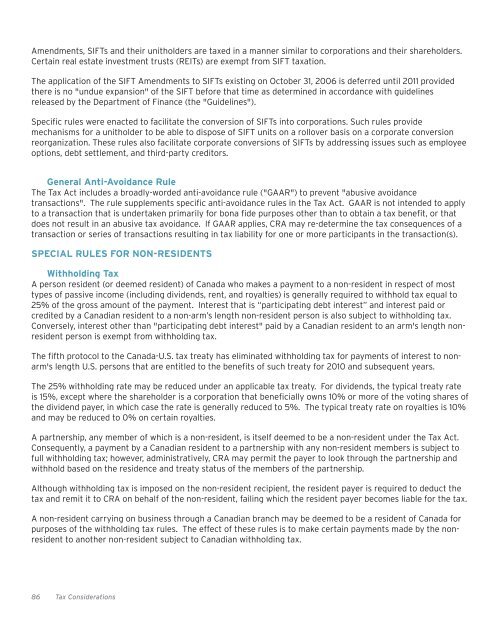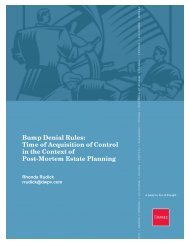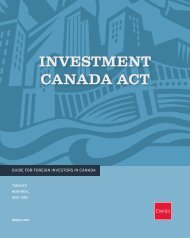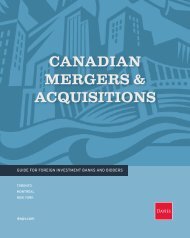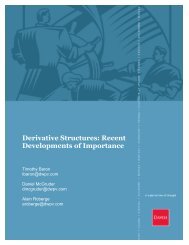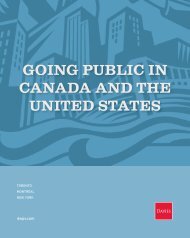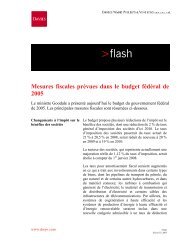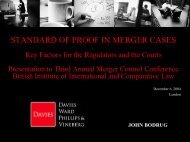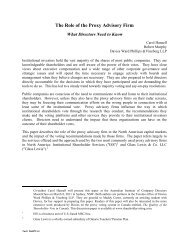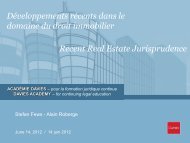expense ("COGPE"), Canadian development expense ("CDE") or Canadian exploration expense ("CEE").Expenditures related to the acquisition of Canadian oil and gas properties or rights are generally classified asCOGPE. Expenditures related to the acquisition of Canadian m<strong>in</strong><strong>in</strong>g properties or rights (<strong>in</strong>clud<strong>in</strong>g, <strong>in</strong> manycases, properties or rights <strong>in</strong> respect of heavy oil) are generally classified as CDE. Expenditures <strong>in</strong> respect of theexploration and development of Canadian resource properties are classified as either CDE or CEE.Once classified as COGPE, CDE or CEE, the expenditures are added to the correspond<strong>in</strong>g cumulative accounts.Subject to certa<strong>in</strong> restrictions, a taxpayer may deduct <strong>in</strong> a taxation year 10% of its cumulative COGPE, 30% ofits cumulative CDE and 100% of its cumulative CEE.Some prov<strong>in</strong>ces, such as Quebec, offer similar or additional <strong>in</strong>centives.Capital TaxThe federal government imposes a capital tax on f<strong>in</strong>ancial <strong>in</strong>stitutions at a rate of 1.25% of their "taxable capitalemployed <strong>in</strong> Canada" <strong>in</strong> excess of $1 billion.The capital tax on corporations that are not f<strong>in</strong>ancial <strong>in</strong>stitutions was elim<strong>in</strong>ated by the federal government for2006 and subsequent taxation years.Some prov<strong>in</strong>ces, <strong>in</strong>clud<strong>in</strong>g Ontario and Québec, also impose their own capital tax on taxable capital employed <strong>in</strong>the prov<strong>in</strong>ce. Ontario capital tax will be elim<strong>in</strong>ated by the middle of 2010 and Québec capital tax is proposed tobe phased out by 2011.Corporate ReorganizationsThe Tax Act permits many corporate reorganizations to be effected on a "rollover" or tax-deferred basis toshareholders. Some reorganizations, such as share-for-share exchanges, are relatively straightforward from atax perspective, whereas others, such as tax-deferred sp<strong>in</strong>-offs, have complex statutory and adm<strong>in</strong>istrativerestrictions.PartnershipsPartnerships are common <strong>in</strong>vestment vehicles <strong>in</strong> Canada because they are generally flow-throughs for taxpurposes. Although partnerships are not taxpayers per se under the Tax Act, a partnership is required tocompute its <strong>in</strong>come as though it were a taxpayer resident <strong>in</strong> Canada. Each member of the partnership <strong>in</strong>cludes<strong>in</strong> <strong>in</strong>come the member's allocable share of the <strong>in</strong>come, ga<strong>in</strong> or loss of the partnership. Special rules apply tolimited partners that may, <strong>in</strong> certa<strong>in</strong> circumstances, restrict their ability to claim losses of a limited partnershipallocated to them.TrustsUnlike partnerships, trusts resident <strong>in</strong> Canada are taxable entities under the Tax Act. However, certa<strong>in</strong> trusts,<strong>in</strong>clud<strong>in</strong>g personal trusts and mutual fund trusts, may be eligible for an offsett<strong>in</strong>g deduction <strong>in</strong> respect ofamounts distributed to beneficiaries. The effect of such rules is to reduce (or elim<strong>in</strong>ate) tax at the trust level.Such distributions are generally taxable <strong>in</strong> the hands of the beneficiaries.As previously noted, the Tax Act may deem non-resident trusts to be resident <strong>in</strong> Canada <strong>in</strong> certa<strong>in</strong>circumstances.SPECIFIED INVESTMENT FLOW-THROUGHSThe Tax Act has been amended to change the taxation of certa<strong>in</strong> publicly-traded trusts and partnershipsreferred to as "specified <strong>in</strong>vestment flow-through" entities or "SIFTs" (the "SIFT Amendments"). Under the SIFTTax Considerations 85
Amendments, SIFTs and their unitholders are taxed <strong>in</strong> a manner similar to corporations and their shareholders.Certa<strong>in</strong> real estate <strong>in</strong>vestment trusts (REITs) are exempt from SIFT taxation.The application of the SIFT Amendments to SIFTs exist<strong>in</strong>g on October 31, 2006 is deferred until 2011 providedthere is no "undue expansion" of the SIFT before that time as determ<strong>in</strong>ed <strong>in</strong> accordance with guidel<strong>in</strong>esreleased by the Department of F<strong>in</strong>ance (the "Guidel<strong>in</strong>es").Specific rules were enacted to facilitate the conversion of SIFTs <strong>in</strong>to corporations. Such rules providemechanisms for a unitholder to be able to dispose of SIFT units on a rollover basis on a corporate conversionreorganization. These rules also facilitate corporate conversions of SIFTs by address<strong>in</strong>g issues such as employeeoptions, debt settlement, and third-party creditors.General Anti-Avoidance RuleThe Tax Act <strong>in</strong>cludes a broadly-worded anti-avoidance rule ("GAAR") to prevent "abusive avoidancetransactions". The rule supplements specific anti-avoidance rules <strong>in</strong> the Tax Act. GAAR is not <strong>in</strong>tended to applyto a transaction that is undertaken primarily for bona fide purposes other than to obta<strong>in</strong> a tax benefit, or thatdoes not result <strong>in</strong> an abusive tax avoidance. If GAAR applies, CRA may re-determ<strong>in</strong>e the tax consequences of atransaction or series of transactions result<strong>in</strong>g <strong>in</strong> tax liability for one or more participants <strong>in</strong> the transaction(s).SPECIAL RULES FOR NON-RESIDENTSWithhold<strong>in</strong>g TaxA person resident (or deemed resident) of Canada who makes a payment to a non-resident <strong>in</strong> respect of mosttypes of passive <strong>in</strong>come (<strong>in</strong>clud<strong>in</strong>g dividends, rent, and royalties) is generally required to withhold tax equal to25% of the gross amount of the payment. Interest that is “participat<strong>in</strong>g debt <strong>in</strong>terest” and <strong>in</strong>terest paid orcredited by a Canadian resident to a non-arm’s length non-resident person is also subject to withhold<strong>in</strong>g tax.Conversely, <strong>in</strong>terest other than "participat<strong>in</strong>g debt <strong>in</strong>terest" paid by a Canadian resident to an arm's length nonresidentperson is exempt from withhold<strong>in</strong>g tax.The fifth protocol to the Canada-U.S. tax treaty has elim<strong>in</strong>ated withhold<strong>in</strong>g tax for payments of <strong>in</strong>terest to nonarm'slength U.S. persons that are entitled to the benefits of such treaty for 2010 and subsequent years.The 25% withhold<strong>in</strong>g rate may be reduced under an applicable tax treaty. For dividends, the typical treaty rateis 15%, except where the shareholder is a corporation that beneficially owns 10% or more of the vot<strong>in</strong>g shares ofthe dividend payer, <strong>in</strong> which case the rate is generally reduced to 5%. The typical treaty rate on royalties is 10%and may be reduced to 0% on certa<strong>in</strong> royalties.A partnership, any member of which is a non-resident, is itself deemed to be a non-resident under the Tax Act.Consequently, a payment by a Canadian resident to a partnership with any non-resident members is subject tofull withhold<strong>in</strong>g tax; however, adm<strong>in</strong>istratively, CRA may permit the payer to look through the partnership andwithhold based on the residence and treaty status of the members of the partnership.Although withhold<strong>in</strong>g tax is imposed on the non-resident recipient, the resident payer is required to deduct thetax and remit it to CRA on behalf of the non-resident, fail<strong>in</strong>g which the resident payer becomes liable for the tax.A non-resident carry<strong>in</strong>g on <strong>bus<strong>in</strong>ess</strong> through a Canadian branch may be deemed to be a resident of Canada forpurposes of the withhold<strong>in</strong>g tax rules. The effect of these rules is to make certa<strong>in</strong> payments made by the nonresidentto another non-resident subject to Canadian withhold<strong>in</strong>g tax.86 Tax Considerations
- Page 1 and 2:
DOING BUSINESSIN CANADAYOUR COMPLET
- Page 3 and 4:
ONTENTSTABLE OF CONTENTSINTRODUCTIO
- Page 5 and 6:
IntroductionPOLITICAL AND CONSTITUT
- Page 7 and 8:
5RealEstateIndustrial and Intellect
- Page 9 and 10:
accordance with directions from the
- Page 11 and 12:
TITLE INSURANCE, TITLE OPINIONS AND
- Page 13 and 14:
11EnvironmentalLawIndustrial and In
- Page 15 and 16:
commercial activities, or carrying
- Page 17 and 18:
The federal government currently re
- Page 19 and 20:
17Types ofBusiness OrganizationIndu
- Page 21 and 22:
provincial law cannot do so as of r
- Page 23 and 24:
partnership, limited partners’ li
- Page 25 and 26:
parties. In Québec, joint venturer
- Page 27 and 28:
25Financing aBusiness OperationIndu
- Page 29 and 30:
The Civil Code of Québec provides
- Page 31 and 32:
29CorporateGovernanceIndustrial and
- Page 33 and 34: Instrument 58-101. The practices re
- Page 35 and 36: 33CompetitionLawIndustrial and Inte
- Page 37 and 38: BID-RIGGINGBid rigging is any agree
- Page 39 and 40: anticompetitive agreements among co
- Page 41 and 42: 39ForeignInvestmentIndustrial and I
- Page 43 and 44: apply for Canadian citizenship. (Pe
- Page 45 and 46: (D)GENERAL REVIEW THRESHOLDSThe fol
- Page 47 and 48: there be an "acquisition of control
- Page 49 and 50: Industrial and Intellectual Propert
- Page 51 and 52: to perform or cause them to be perf
- Page 53 and 54: Registration grants an exclusive ri
- Page 55 and 56: PIPEDA applies in all provinces of
- Page 57 and 58: Employment LawCanadian employment l
- Page 59 and 60: displacement, laying-off, suspensio
- Page 61 and 62: easonable cause to believe that the
- Page 63 and 64: 63Retirement Plans, EmployeeBenefit
- Page 65 and 66: • funding;• eligibility;• pen
- Page 67 and 68: 67Temporary Entry andPermanent Resi
- Page 69 and 70: INTERNATIONAL AGREEMENTSIn recent y
- Page 71 and 72: immigrant in another class, he or s
- Page 73 and 74: 73Bankruptcy andInsolvency Proceedi
- Page 75 and 76: BANKRUPTCYBankruptcy results in the
- Page 77 and 78: INTERNATIONAL BANKRUPTCYASSETS LOCA
- Page 79 and 80: Tax ConsiderationsThis chapter prov
- Page 81 and 82: TAX REPORTINGAnnual Tax ReturnsCana
- Page 83: Québec has legislation that limits
- Page 87 and 88: Conversely, where a Canadian reside
- Page 89 and 90: A person, whether resident in Canad
- Page 91 and 92: APPENDIX I: CANADA’S IN FORCE TAX
- Page 93: TORONTODAVIES WARD PHILLIPS & VINEB


